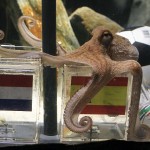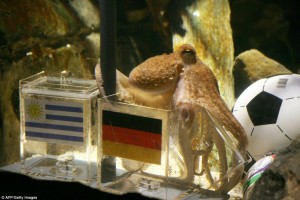Paul octopus predicts Spain as world cup winner!
 What has eight legs but no backbone? No, not the England team’s lily-livered defence.
What has eight legs but no backbone? No, not the England team’s lily-livered defence.
It’s Paul the octopus – who, incredibly, has correctly predicted the outcome of all six of Germany’s World Cup matches.
Today, during a live television broadcast, Paul predicted Germany would beat Uruguay in the third place playoff match on Saturday – his seventh prediction of the tournament.
And now he has made his eighth – and possibly the most important – prediction: that Spain will win the final.
His latest success came on Wednesday night, when he forecast Spain would defeat the Germans in the semi-final.
Paul was born in Weymouth in 2006 but now resides in Germany’s Oberhausen’s Sea Life Aquarium.
He predicts matches by choosing to eat a mussel from boxes emblazoned with the flags of the German team and its rivals.
In the group stages, he correctly predicted German victories over Australia and Ghana and the country’s loss to Serbia.
England and Argentina then produced spineless performances in the next two rounds to ensure that Paul’s predictions that Germany would win came to pass. Then came Germany’s defeat to Spain.
Paul first started predicting matches during the 2008 European Championships, when four out of his six choices were correct.
Mathematicians have found the probability of guessing the correct result six times consecutively is less than 0.5 per cent, or 216 to 1.
Paul’s soothsaying has turned him into a star in Germany. But he may well prove to be the victim of his own success.
After Argentina lost to Germany in the quarterfinal, the Argentines threatened to capture, kill him and serve him with potatoes.
Even some Germans have turned against their eight-legged oracle, suggesting Oberhausen restaurants should soon offer grilled octopus on their menus.
 So how does Paul do it? According to experts, it could all be down to the shape of the competitors’ flags.
So how does Paul do it? According to experts, it could all be down to the shape of the competitors’ flags.
‘Experiments have shown that the Octopus vulgaris can distinguish brightness, size, shape, and horizontal or vertical orientation of objects.
‘They are more drawn to horizontal shapes,’ said Shelagh Malham, a lecturer in the School of Ocean Sciences at Bangor University.
But can they see colour? Not according to Janet Voight, associate curator of invertebrates at The Field Museum of Natural History in Chicago.
‘No, there’s no evidence that octopus have colour vision. The colour red disappears ten feet under water anyway.’
So Paul can’t see in colour but is drawn to bold horizontal shapes.
These are just the shapes that appear on the flags of Germany, Spain and Serbia.
But how did he pick between these flags? The German flag is quite bold but the Spanish flag has a broader yellow horizontal stripe, explaining Paul’s attraction to Spain. Similarly, the Serbian flag is brighter and more vivid than the German flag.
Although octopuses cannot see specific colours, they can determine differences in hue and brightness. These are probably the factors that led to Paul choosing the teams he did.
But he’ll need to cash in on his success soon. At the age of four Paul is unusually old for an octopus, which, in the wild, don’t usually live much past two years.
This story may not have legs for much longer. . .
Source: daily mail
Filed under: Strange news, Television

